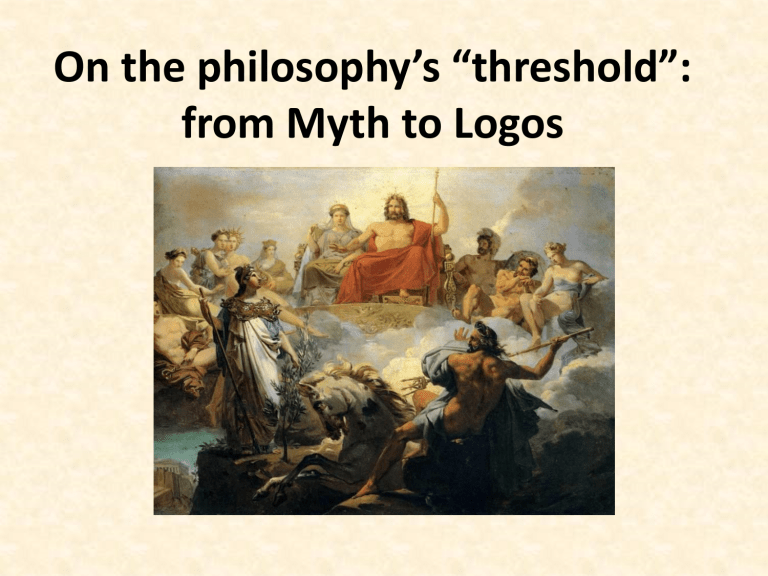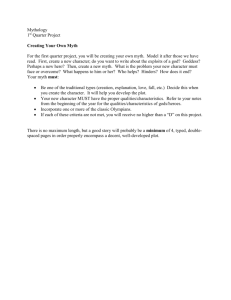
On the philosophy’s “threshold”: from Myth to Logos Mythology is a system of legends, in which is stated the understanding of the emergence and structure of the world and man as its inherent element. Myth is the first form of cultural activity of man. Cosmogonic myths are about the origin of the universe. Cosmological myths are about the structure of the universe Hesiod This way, the myth had the function to explain how the world was created and pass this information from generation to generation. As to say, the myth is a kind of collective memory of a people or a nation. Myth fulfilled also the function to keep and preserve the ancient order of the society, as far as the knowledge goes from ancestors, thus gives that knowledge something sacral and inviolable. Myth arranged the order of the society in consequence of the reproduction of the inherited customs and, this way, this process can repeat for a very long time, without any changes. The myth made the world “closed” and cyclic. Myth affected the feeling of the man and did not affect his judgment. Consequentially, there was no need to find a rational explication to the phaenomena of the nature. Myth affected the feeling of the man and did not affect his judgment. Consequentially, there was no need to find a rational explication to the phaenomena of the nature. The myth had the main aim to create archetypes and “behavioral” pattern for the man. On the contrary, the philosophy found its origin not in the mythological samples, but in the creation of ideas and conceptions. The philosophy is a process coming from the human for the human and not from the supernatural. Philosophy arose in new social and political conditions of the Greek city – state (πόλις) (VI- V century) , where developed a new political form such as democracy. As you can easily understand, the most important consequence of the democracy was freedom. The power was in the hand of the Ecclesiae (the popular assembly), where every citizen had the right to defend his ideas, opinions, and so on. The orator became an important figure in Athens and the power of the word took the place of the authority. Thus, the argumentation, the discussion, the dispute were the centre of the intellectual life of that time. The man of the city state had the desire to know and change his knowledge, no more being satisfied with the explication of the myth. The philosophy helped the process of development of the man towards the real knowledge. Knowledge is the opposite of the ignorance, as far as knowledge is our conception, which corresponds to reality. Knowledge destroys the illusions and the false meaning in order to create a new, true conception of the world. On this ground we can see how the Logos (λόγος) came on. Originally this word meaning "a ground", "a plea", "an opinion", "an expectation", "word", "speech", "account", "to reason“. For the first time Logos was a word used by Heraclitus and he thought that it was an Universal law: “Nothing happens by accident, but logos and necessity”. Plato said that logos had three different significances: thinking expressed in words; the enumeration of the characteristic of a thing; the determination of a special feature of a thing, which differs it from all the other things. The Logos is the “right word” also. By the way, the Logos is an universal principle which will play a great role in the European philosophy , particularly in the Hegel’s theory, and in our cultural history also, if we consider that Logos was used in the Bible, where it is identified with Jesus Cristh. This way, we can easily understand, that the Logos found the ontological way of the European philosophical world. More than this, the philosophy gave the birth to the search for the ultimate principles and beginning of the world.






